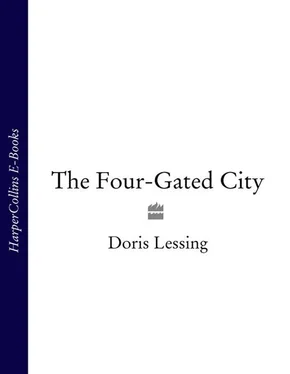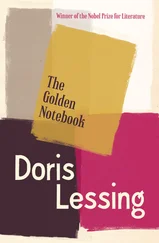Mark was not there. Colin was not there. Invisibly and very strongly present that night was ‘communism’ – a threat. Everyone knew that Mark was with his brother and that his brother was in bad trouble. People either asked sympathetically after them, or – mostly – did not mention them at all.
If Mark and Colin represented communism, then they represented the view that the Labour Party had always been, would always be, could never be anything else but, a function of capitalism, the force, or trend, in the British nation which made capitalism work, saved it, bolstered it – and could be no more than that even if the Labour Party were composed entirely of Arthurs. (Who, of course, hated the communists, local and international with a bitter passion.) The Labour Party had got in because capitalism (The Tories) being in a jam after the war, it was the right time for it to get in. It had fulfilled none of its election pledges because it could not possibly do so – only a communist government was in a position to change anything radically. And here presented itself an interesting paradox, or political anomaly. For a century at least communism had defined socialist non-communism as bound to fulfil this function; the fatalism, the determinism, which is so oddly rooted in that revolutionary party’s heritage must have it that Labour, or social democracy, by its nature could do no more than what capitalism would allow it do. Q.E.D. Why, then, so much abuse, the gutter criticism, the emotionalism – why such a crying out against the inevitably-behaving and conditioned function, the Labour Party? One might almost believe it a form of love, or of hope; as if, rooted right there, at the heart of an ‘inevitability’, of something determined, there had always been, in fact, half a hope, that perhaps, after all – the Labour Party could be socialist.
Among the guests there was also, but not for long (politics bored him he said) Jimmy Wood, Mark’s partner. He was a short, fair man. Wispy. He had soft baby’s hair on his large head. He had a carefully kept, almost scared, smile. He moved about, with a glass of whisky in his hand, listening, and looking, always on the edge of a group, always with his half-smile. He did not look at the television set, only at the other guests, and as if he were a stranger doomed to be one. He talked briefly to Martha, smiling, or rather, grinning and clutching his glass. He wore strong spectacles. Behind them were small, strained-looking eyes. Mark said he was a variety of scientific genius.
Half through the evening Mark called from Cambridge to say that Martha should get James’s room ready for Sally: she was coming back with him. Paul too.
Martha therefore was away from the party for some time. When she came back, they were saying that even if Labour did get back, it must be with a reduced majority. Margaret and some Tory friends who had come in from a near-by hotel drank to the defeat of the Reds (Labour). Those ‘Reds’ near them drank an opposition toast – everything was very jolly. Mark had sounded harried, even rather frightened. Jimmy Wood went, on hearing that Mark would not be there for at least two hours. Mark said that Jimmy and he talked – days at a time. Mark said Jimmy was a lonely man; and so little given to talking about personal affairs, he did not know to this day if he were married.
In the room were two new people. Young men. One was Graham Patten, John’s son by a former marriage. He had a friend with him. Both were in their last year at Oxford. They stood on the side of the noisy scene and despised it. They were also at pains to despise television. Politics were unfashionable among the undergraduates of Britain at that time: Graham and Andrew thought politics were derisory. Dandyism was fashionable: they wore embroidered waistcoats and would not surrender their cloaks, one black lined with scarlet, one scarlet lined with leopard skin. They both maintained supercilious smiles, until someone, unable to stand their frustration, went up to them, when they delivered themselves of a great many observations on a large variety of subjects. They were a bit better when they got drunk, if not very endearing.
Margaret was heard to apologize for them: they would grow out of it, she said.
Mark had told Martha that he would take Sally and the child straight up to the room. She listened for him to come in, and went quietly out into the hall when he did. But Margaret was there seeing some guests out. Afterwards Martha kept the clearest picture of that brief scene.
At the door were a group of noisily tipsy people on their way back to the hotel where they proposed to celebrate Labour’s so greatly reduced majority. Margaret was saying ‘Good-bye! Goodbye!’ to them; but she was watching Mark, who stood on the stairs with Sally-Sarah, who had Paul in her arms. By Margaret was Hilary Marsh, observing them all – a quietly smiling, unnoticed man. Sally-Sarah looked ill. The little boy had his thumb in his mouth and stared over his mother’s shoulder with large, blank, shocked eyes. The two were wrapped in a travelling rug Mark had taken from the car. In this cheerful din (the noise from the big room was shattering, when one listened to it from outside) they had the look of refugees, of people in flight.
Mark summoned Martha with his eyes. She went to Sally-Sarah, while Margaret came forward saying: ‘Sally! Is Colin here? What’s the matter?’
Martha led the two up and away from Margaret and her party, while Mark stayed. Sally-Sarah was quite passive. She was trembling. In the big bedroom on the second floor, she stood until Martha suggested she might sit; and sat, staring until Martha said she might like to get into bed. Martha took the child and undressed him. Sally-Sarah was undressing herself like an automaton. Offered tea, coffee, milk, she did not hear. Martha put them both in the same bed.
When she left them, Sally-Sarah had not said one word.
Downstairs the big room was emptying fast, because of Mark’s presence. He stood with his back to a wall, grave, anxious, looking past the two undergraduates who stood in front of him. It was now clear why they had come to this party: to meet the writer. It appeared that some tutor or teacher had said that Mark’s novel was influenced by Kierkegaard. Andrew had his clever young face, now rather flushed by drink, close to Mark’s, and he was unloading a series of observations: he did not agree with the tutor, it seemed. He was explaining to Mark why the novel was to be compared with Stendhal’s The Red and The Black. Mark was not listening. Close to this group Hilary Marsh stood, observing. Martha went forward to rescue Mark. She listened while the two young men, unwillingly accepting her as substitute, continued their ingenious literary game, their eyes not on her, but past her, on Mark. Hilary Marsh was expressing concern, to Mark about his brother Colin. After a few moments Mark said: ‘Yes. Yes. Excuse me …’ and went out of the room.
It now occurred to the two young men that Mark might be upset about his brother Colin whose name had been all over the newspapers that day. When Martha left the party finally they were being witty about spies to Hilary Marsh, who, it seemed, was quite prepared to listen to them.
Upstairs Martha found Mark in Sally-Sarah’s room. She was not asleep. She was curled up in bed, like a child, her child asleep beside her. Her eyes were shocked.
She said, ‘Thank you. Thank you. You are very kind. Thank you. Thank you.’ Mark and Martha left her.
‘I’ll tell you in the morning,’ said Mark, ‘I must get rid of …’ He went downstairs.
Colin’s principal, the man with whom he had worked for years, had been sentenced to fourteen years in prison for giving scientific information to the Russians. Next day Mark stayed in his room. Sally stayed in her room. Martha kept buying newspapers. Late that afternoon it was announced that Colin Coldridge son of – etc. etc., brother of the writer Mark Coldridge, and of Arthur Coldridge the well-known left-wing member of Parliament, had fled the country, presumably to Russia, leaving behind his wife and his son.
Читать дальше












